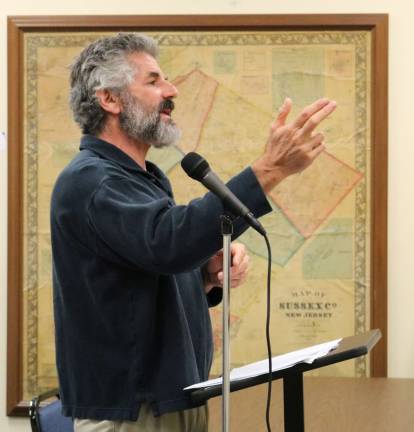Sussex mayor questions condition of Clove Lake

SUSSEX BOROUGH — After receiving questions and complaints from residents, Sussex Borough Mayor Katherine Little demanded answers about the condition of Clove Lake.
“What effect do these treatment have on the fish and birds,” Mayor Little asked Larry Kovar of Aquatic Analysis. “Because I’m getting people telling me that it is killing them!”
Kovar and his team from Aquatic Analysis have been contracted to survey and treat Clove Lake. Kovar was initially scheduled to give a full report on Clove Lake on Oct. 17, but Little asked Kovar to address the complaints at Tuesday night’s meeting, two weeks ahead of schedule.
Kovar admitted to receiving several calls himself, concerning the aquatic wildlife at Clove Lake. He assured the council that all herbicides and algaecides used on the lake are federally approved.
“The only way a herbicide or an algaecide is going to kill anything in the water, is through oxygen depletion,” Kovar said, citing his findings on the lake.
Kovar also noted that a treatment of copper-sulfate at too high a concentration could kill the wildlife. He admitted that Copper-Sulfate was used in the treatment of Clove lake, but at a lower concentration than approved by the state.
“The state allows us to do one part-per-million,”Kovar stated. “But, because there are trout downstream, we used one-half, or point-five parts-per-million.”
“That’s a very low concentration that will not have any adverse effects on wildlife,” Kovar said.
“If anyone’s telling you that these chemicals are killing the birds or the fish, they should basically sit down and read a bunch of journals, and learn about what they’re talking about before they make those comments,” Kovar noted.
Kovar originally proposed a treatment plan for Clove Lake in May, which included 1-2 weed treatments, and 4-5 algae treatments, as well as bi-weekly surveys. The estimated cost was $10,600.
Since June, Aquatic Analysis performed 6 surveys, 1 weed treatment, and 3 treatments for algae. The cost amounted to $5,985.
A fourth algae treatment was scheduled for late September, but Kovar decided against it, fearing harm to the lake.
A new type of algae has sprung up in the lake, filamentous algae, due to the heavy rainfall this year.
From January through August of 2016, Sussex received 10.64 inches of precipitation. In the same time period this year, the area received 28.96 inches, an increase of more than 10 inches.
Kovar said the original plan to control the existing algae and invasive plant species of Eurasian Watermilfoil and Curly-Leaf Pondweed, were showing signs of success. But, with the new type of filamentous algae forming in the lake, due to excess precipitation, Kovar feared killing it would upset the ecological balance of the lake.
Kovar recommended that native water-lilies be planted instead of using chemicals on the filamentous algae. Water-lilies act as a natural water filter.
Kovar is set to give a full summary on the condition of Clove Lake at the October 17th meeting.